
23 +
Distributors Network

761
Ayurvedic Doctors

284+
SKUs

50+
Years of Legacy & Experience

Distributors Network

Ayurvedic Doctors

SKUs

Years of Legacy & Experience

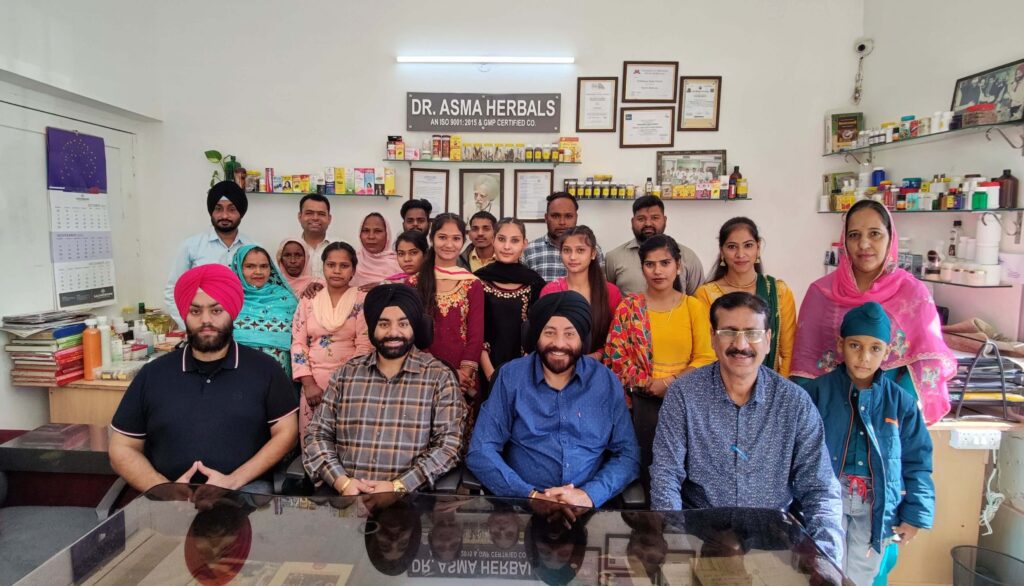
Dr. Asma Herbals offers complete Third Party Contract manufacturing for Ayurvedic medicine and herbal products and packaging services. Asma Herbals has streamlined contract manufacturing services to assist you with each step of the process, including planning, formulation, production, labeling, and packaging.
We are an ISO 9001: 2015 and Ayurvedic GMP certified third-party manufacturing company to provide a state-of-the-art manufacturing facility that uses the most premium technology in producing ayurvedic products. All manufacturing and testing are conducted in our GMP-certified facility.
You will be assisted by Ayurved Expert CP Singh Chawla ji (B.Sc. Medical, D.Pharmacy Ayurvedic), Chief Operating Officer to provide you with a free, no-obligation quote for your contract manufacturing needs within a given time span.
Moreover, Prabhdeep Singh Chawla, Chief Marketing & Sales Manager, B.Sc. Medical, Herbal Medicine UofM, USA, MBA Marketing, France will help you with bulk, private labeled, or even custom formulation orders.
Introduction: Americans & Europeans are increasingly turning to Ayurvedic medicine to embrace holistic wellness. If you’re eager to explore the world of Ayurveda and are considering importing Ayurvedic medicines from India to Europe or America, you’re in the right place. In this comprehensive guide, we’ll walk you through the process of importing these natural remedies to ensure you receive authentic and high-quality products while complying with European regulations.
Step 1: Research and Identify a Reputable Supplier
The first step in your Ayurvedic medicine import journey is to find a trustworthy supplier in India. Do thorough research to discover suppliers with a strong reputation for quality and authenticity. Look for certifications such as GMP (Good Manufacturing Practices) and check for positive customer reviews.
Step 2: Understand American or European Import Regulations
Before you proceed, it’s crucial to familiarize yourself with the import regulations and customs procedures in your European country. Each country may have varying rules and requirements for importing herbal and medicinal products. Contact the customs authorities or visit their official website to obtain information on specific regulations and documentation needed for importing Ayurvedic medicines.
Step 3: Verify Product Authenticity
Ayurvedic medicines can vary in terms of quality and authenticity. To ensure you receive genuine products, request certificates of authenticity, quality control, and product testing from your chosen supplier.
Dr. Asma Herbals is certified Ayurveda Manufacturer according to the norms of AYUSH-GMP and ISO 9001: 2015 Certified Facility. They are now under process for ZED Certified Company which fulfills “Zero Defect Zero Effect”.
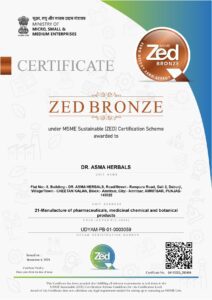
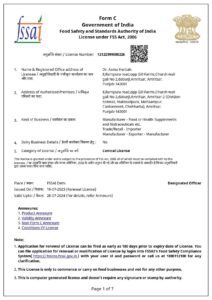
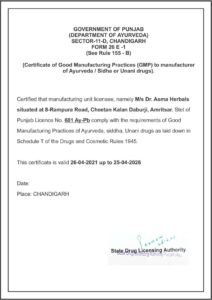
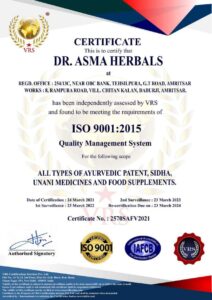
Step 4: Place Your Order
Once you’ve selected a reputable supplier and are satisfied with the authenticity of their products, proceed to place your order. Clearly communicate the quantity, packaging preferences, and shipping details. Request a proforma invoice that itemizes the total cost, including product price, shipping charges, and any applicable taxes or duties.
Step 5: Payment and Shipping
Most Indian suppliers accept international payments through secure methods like PayPal, bank transfers, or credit cards. Opt for a payment method that offers security and buyer protection. We recommend via Bank Transfer through SWIFT Channel.
For shipping, select a reputable carrier such as DHL, FedEx, or UPS, considering your budget and delivery timeline. Be sure to track your shipment to monitor its progress.
DHL Charges are around: Rs. 750/- per KG*
IndiaPost: Rs. 500/- per KG*
*Prices are approximate, confim the latest rates on their respective websites.
Step 6: Customs Clearance
Upon arrival in Europe, your Ayurvedic medicines will go through customs clearance. Ensure you provide all necessary documentation and adhere to import regulations. Should you encounter any issues or have questions, consult a customs broker or an expert in European import regulations for assistance.
Step 7: Quality Assurance and Testing
Before using the imported Ayurvedic medicines, consider having them independently tested by a reputable laboratory to confirm their safety and authenticity. This extra step will provide added assurance that the products meet European quality standards.
Certain tests which as Physiological Testing, Heavy Metals and Microbial Tests and Pesticides Test are minimally required by the European Medical Agency or USFDA.
Step 8: Registration and Documentation
In many European countries, you may need to register as an importer of herbal medicines. This registration process can vary, so it’s essential to check with your local health authority or regulatory body. Ensure that you have all the necessary documentation, including a valid import license and any permits required for handling and distributing herbal products.
Step 9: Language and Labeling Requirements
European regulations often require that labels and product information be in the official language(s) of the country where the product will be sold. Ensure that all packaging and labeling comply with these language requirements. Include essential information such as product name, ingredients, dosage instructions, expiration date, and any necessary warnings or precautions.
Step 10: Quality Control and Testing
Ayurvedic medicines imported into Europe should meet high-quality standards to ensure consumer safety. Consider collaborating with a quality control expert or laboratory in Europe to conduct tests on the imported products. Common tests may include assessing the presence of heavy metals, microbial contamination, and the concentration of active ingredients. Maintaining records of these tests is essential for compliance and transparency.
Step 11: Distribution and Marketing
Once your Ayurvedic medicines clear customs and meet all regulatory requirements, you can proceed with distribution and marketing. Ensure that your distribution channels, such as retailers or e-commerce platforms, also adhere to local regulations and guidelines for selling herbal products.
Step 12: Stay Informed
Regulations related to herbal and Ayurvedic products in Europe can evolve. It’s crucial to stay informed about any updates or changes in the regulatory landscape. Regularly consult with regulatory authorities and industry associations to ensure your products remain compliant.
Step 13: Seek Professional Assistance
Navigating the complexities of importing Ayurvedic medicines into Europe may require legal, regulatory, or logistical expertise. Consider consulting with professionals who specialize in this field, such as customs brokers, regulatory consultants, or legal advisors. Their knowledge can help you navigate potential challenges and ensure a smooth import process.
Step 14: Marketing and Education
Educate your target audience about the benefits of Ayurvedic medicines through marketing efforts. Create informative content that explains the principles of Ayurveda, the specific benefits of the products you offer, and how they can be integrated into a holistic wellness routine. Utilize digital marketing strategies, including social media, email marketing, and content marketing, to reach your audience effectively.
Step 15: Compliance with EU Regulations
European Union (EU) regulations are stringent when it comes to herbal and medicinal products. Ensure that your Ayurvedic medicines comply with the EU’s Traditional Herbal Medicinal Products Directive (THMPD) or other relevant regulations in your specific European country. This may involve providing comprehensive safety and efficacy data, which can be a complex process. Seek assistance from experts in regulatory affairs to navigate these requirements.
Step 16: Distribution Channels
Select your distribution channels carefully. You can consider partnering with existing wellness stores, natural product retailers, or pharmacies in Europe to reach a wider audience. Alternatively, you might opt for direct-to-consumer sales through e-commerce platforms. Analyze market trends and consumer preferences to determine the most suitable distribution strategy for your products.
Step 17: Customer Support and Feedback
Establish robust customer support mechanisms to address inquiries, concerns, and feedback from customers in Europe. Providing excellent customer service helps build trust and loyalty. Encourage customers to share their experiences and reviews, which can be valuable for marketing and improving your products.
Step 18: Sustainability and Ethical Sourcing
Increasingly, consumers in Europe are concerned about sustainability and ethical sourcing. Highlight any sustainable practices or certifications related to your Ayurvedic products, such as organic sourcing or fair trade partnerships. Emphasize your commitment to environmentally friendly and socially responsible practices.
Step 19: Regulatory Updates
Stay vigilant about changes in regulations and standards related to herbal and Ayurvedic products in Europe. Join industry associations and networks to receive updates and collaborate with other professionals in the field. Being proactive in addressing regulatory changes will help you maintain compliance and adapt to evolving requirements.
Step 20: Building Partnerships
Consider building partnerships with Ayurvedic practitioners, yoga studios, wellness centers, and health professionals in Europe. These partnerships can help you promote your products and offer valuable guidance to customers seeking holistic wellness solutions.
Step 21: Product Diversification
Consider diversifying your product range to cater to a broader audience. Ayurveda offers a wide array of products, including herbal supplements, skincare, haircare, and wellness teas. Expanding your product line can attract a more diverse customer base with varying wellness needs.

Step 22: Packaging and Branding
Invest in attractive and informative packaging that reflects the authenticity and essence of Ayurveda. Well-designed packaging not only enhances the appeal of your products but also communicates their quality and purpose to consumers. Effective branding can help your Ayurvedic medicines stand out in the European market.
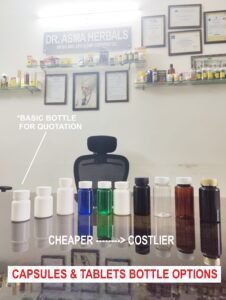
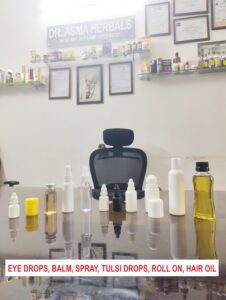
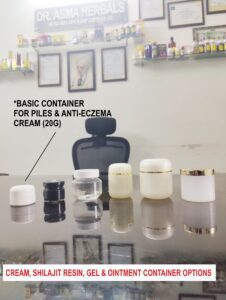
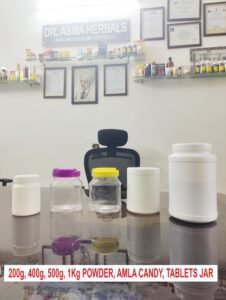
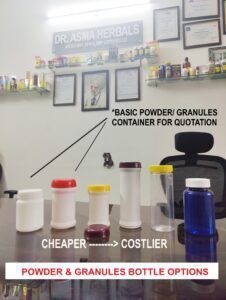
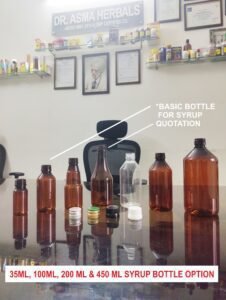
Step 23: Certification and Compliance
Ensure that your products comply with European regulations regarding herbal and Ayurvedic medicines. Seek certification and compliance with EU standards, and provide clear documentation to customs and regulatory authorities as required. Be prepared for inspections and audits to demonstrate the safety and quality of your products.
Step 24: Market Research and Trends
Stay updated with market trends and consumer preferences in the European wellness and natural products sector. Conduct market research to identify emerging trends and customer demands, allowing you to adapt your product offerings and marketing strategies accordingly.
Step 25: Building Trust
Building trust in your brand is essential for long-term success. Transparency about the sourcing, production, and testing of your Ayurvedic medicines can instill confidence in your customers. Share information about the origins of ingredients, manufacturing processes, and quality control measures on your website and marketing materials.
Step 26: Customer Education
Offer educational resources to help consumers understand Ayurveda and the specific benefits of your products. Host webinars, workshops, or informational sessions to teach customers how to incorporate Ayurvedic medicines into their daily routines. Empower them to make informed choices about their wellness.
Step 27: Monitoring and Feedback
Regularly monitor the performance of your Ayurvedic products in the European market. Analyze sales data, customer feedback, and reviews to identify areas for improvement. Use this information to refine your products, marketing strategies, and customer support.
Step 28: Adherence to Local Regulations
If you plan to expand your Ayurvedic business to multiple European countries, be aware that regulations can differ from one nation to another. Research and adapt your compliance strategy to meet the specific requirements of each country where you operate.
Step 29: Network and Collaborate
Networking within the European wellness industry can lead to valuable partnerships and collaborations. Connect with like-minded businesses, wellness practitioners, and influencers who share an interest in Ayurveda. Collaborative efforts can help expand your reach and brand visibility.
Step 30: Quality Control and Assurance
Maintain a rigorous quality control and assurance program to ensure the consistency and safety of your Ayurvedic products. Regularly inspect your supply chain, conduct batch testing, and establish clear quality control protocols. This commitment to quality will build trust with customers and regulators.
Step 31: Ethical Sourcing and Sustainability
Emphasize ethical sourcing and sustainability in your supply chain. European consumers often value products that are sourced responsibly and have minimal environmental impact. Highlight your commitment to fair trade practices, environmentally friendly sourcing, and sustainable production methods.
Step 32: Language Localization
Since Europe is a continent with diverse languages, consider localizing your product packaging and marketing materials to cater to specific regions. Ensure that your product information and labeling comply with the linguistic requirements of each target country to enhance accessibility.
Step 33: Pricing and Competitiveness
Research the pricing strategies of competitors in the European Ayurvedic market. Ensure that your pricing is competitive while maintaining profitability. Be prepared to adjust your pricing strategy based on market dynamics, demand, and consumer preferences.
Step 34: Customer Support and Accessibility
Offer responsive and accessible customer support for your European customers. Provide multiple channels for inquiries and assistance, including email, chat, and phone support. Accessibility and prompt responses can enhance the overall customer experience.
Step 35: Product Innovation
Stay innovative in product development to meet evolving consumer needs. Continuously research and introduce new Ayurvedic formulations and products that align with current wellness trends. Engage with your customer base to gather feedback and ideas for product enhancements.
Step 36: Legal and Liability Considerations
Understand the legal and liability aspects of importing and selling herbal and Ayurvedic products in Europe. Comply with labeling and advertising regulations, and consider product liability insurance to protect your business in case of unexpected issues or claims.
Step 37: Cultural Sensitivity
Demonstrate cultural sensitivity in your marketing and communications. Respect the cultural nuances and diversity within Europe, and tailor your messaging to resonate with the cultural values and preferences of each region or country you target.
Step 38: Research and Development
Invest in research and development to explore new applications of Ayurvedic principles and ingredients. Collaborate with research institutions or experts in Ayurveda to enhance the credibility and effectiveness of your products.
Step 39: Networking and Trade Shows
Participate in wellness trade shows, conferences, and networking events in Europe. These events provide opportunities to connect with potential distributors, retailers, and partners, and to gain insights into market trends and consumer preferences.
Step 40: Continuous Learning
Stay committed to continuous learning and improvement. Ayurveda is a vast and evolving field, and staying informed about the latest developments and research can position your brand as a leader in the industry.
Conclusion: Importing Ayurvedic medicines from India to Europe can be a fulfilling and profitable endeavor when approached with careful planning, adherence to regulations, and a dedication to holistic wellness. By incorporating these additional considerations into your business strategy, you can establish a thriving presence in the European market while promoting the principles of Ayurveda and holistic well-being
These statements have not been evaluated by the Food and Drug Administration. Dr. Asma Herbal’s products are not intended to diagnose, treat, cure, or prevent any disease. The information on this website is for educational purposes only and is not a substitute for medical advice, diagnosis or treatment. For more information pertaining to your personal needs please see a qualified health practitioner.
To check availability and rates please fill out the form below and we’ll get back to you within 24-48 hours.